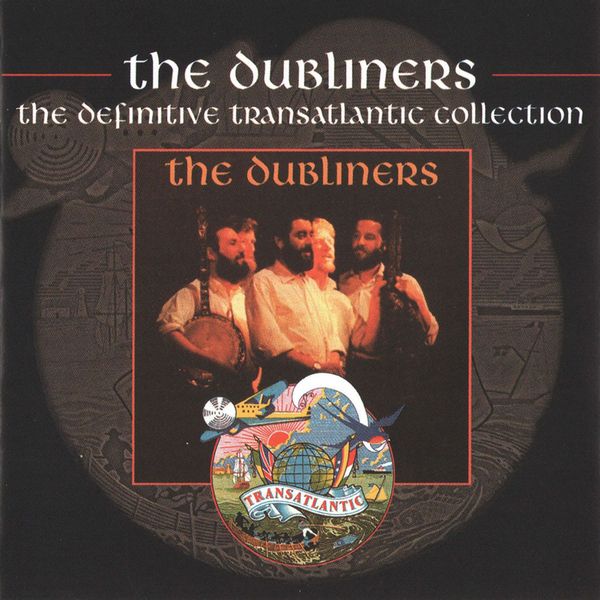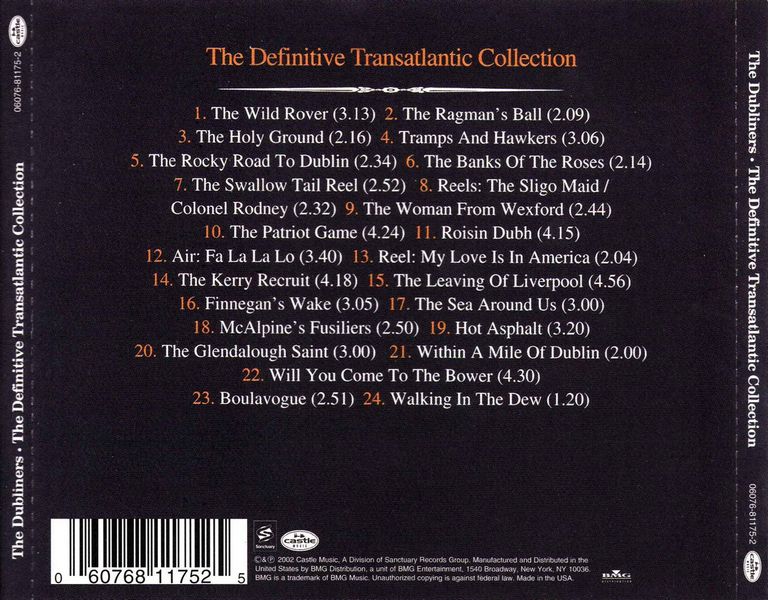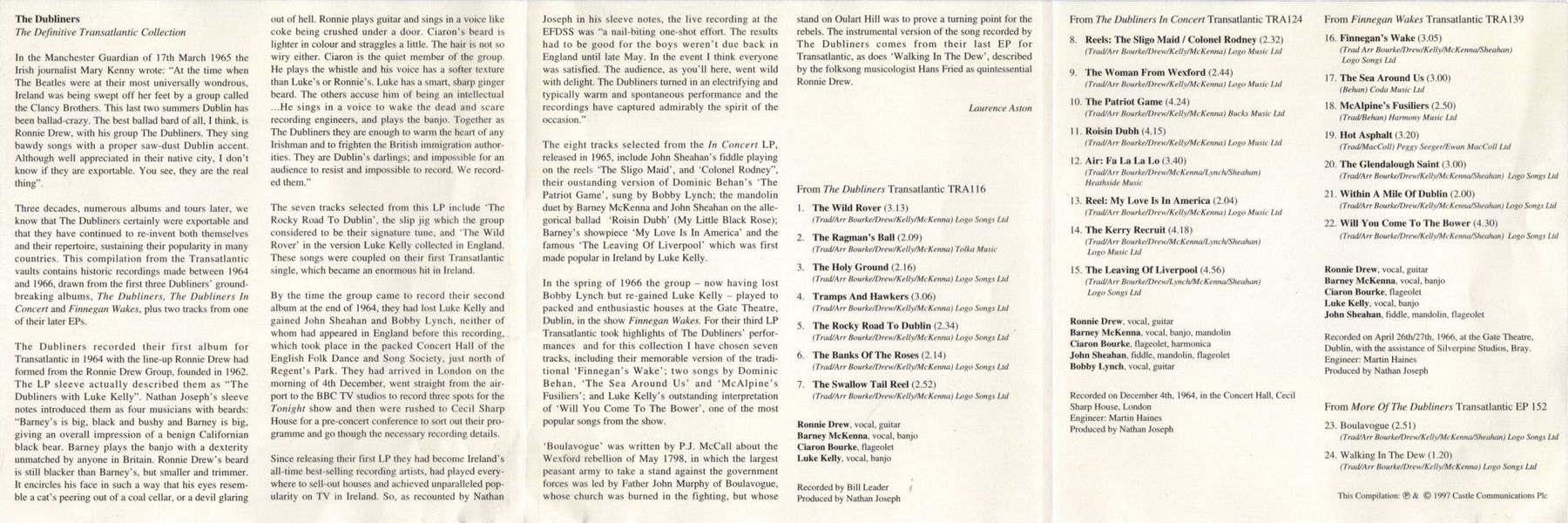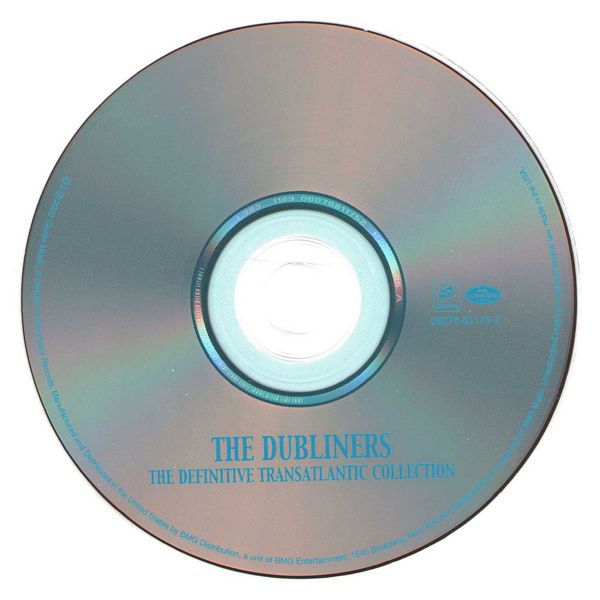

 |

 |

 |
Sleeve Notes
A new 24-track compilation from the Transatlantic vaults with historic recordings made between 1964 and 1966, drawn from three of The Dubliners' ground-breaking albums: The Dubliners, The Dubliners In Concert and Finnegan Wakes, plus two tracks from a hard-to-find EP More Of The Dubliners.
In the Manchester Guardian of 17th March 1965 the Irish journalist Mary Kenny wrote: "At the time when The Beatles were at their most universally wondrous. Ireland was being swept off her feet by a group called the Clancy Brothers. This last two summers Dublin has been ballad-crazy. The best ballad bard of all. I think, is Ronnie Drew, with his group The Dubliners. They sing bawdy songs with a proper saw-dust Dublin accent. Although well appreciated in their native city. I don't know if they are exportable. You see. they are the real thing".
Three decades, numerous albums and tours later, we know that The Dubliners certainly were exportable and that they have continued to re-invent both themselves and their repertoire, sustaining their popularity in many countries. This compilation from the Transatlantic vaults contains historic recordings made between 1964 and 1966. drawn from the first three Dubliners' groundbreaking albums. The Dubliners. The Dubliners In Concert and Finnegan Wakes, plus two tracks from one of their later EPs.
The Dubliners recorded their first album for Transatlantic in 1964 with the line-up Ronnie Drew had formed from the Ronnie Drew Group, founded in 1962. The LP sleeve actually described them as "The Dubliners with Luke Kelly". Nathan Joseph's sleeve notes introduced them as four musicians with beards: "Barney's is big. black and bushy and Barney is big. giving an overall impression of a benign Californian black bear. Barney plays the banjo with a dexterity unmatched by anyone in Britain. Ronnie Drew's beard is still blacker than Barney's, but smaller and trimmer. It encircles his face in such a way that his eyes resemble a cat's peering out of a coal cellar, or a devil glaring out of hell. Ronnie plays guitar and sings in a voice like coke being crushed under a door. Ciaron's beard is lighter in colour and straggles a little. The hair is not so wiry either. Ciaron is the quiet member of the group. He plays the whistle and his voice has a softer texture than Luke's or Ronnie's. Luke has a smart, sharp ginger beard. The others accuse him of being an intellectual ...He sings in a voice to wake the dead and scare recording engineers, and plays the banjo. Together as The Dubliners they are enough to warm the heart of any Irishman and to frighten the British immigration authorities. They are Dublin's darlings; and impossible for an audience to resist and impossible to record. We recorded them."
The seven tracks selected from this LP include 'The Rocky Road To Dublin', the slip jig which the group considered to be their signature tune, and 'The Wild Rover' in the version Luke Kelly collected in England. These songs were coupled on their first Transatlantic single, which became an enormous hit in Ireland.
By the time the group came to record their second album at the end of 1964, they had lost Luke Kelly and gained John Sheahan and Bobby Lynch, neither of whom had appeared in England before this recording, which took place in the packed Concert Hall of the English Folk Dance and Song Society, just north of Regent's Park. They had arrived in London on the morning of 4th December, went straight from the air port to the BBC TV studios to record three spots for the Tonight show and then were rushed to Cecil Sharp House for a pre-concert conference to sort out their programme and go though the necessary recording details.
Since releasing their first LP they had become Ireland's all-time best-selling recording artists, had played everywhere to sell-out houses and achieved unparalleled popularity on TV in Ireland. So, as recounted by Nathan Joseph in his sleeve notes, the live recording at the EFDSS was "a nail-biting one-shot effort. The results had to be good for the boys weren't due back in England until late May. In the event I think everyone was satisfied. The audience, as you'll here, went wild with delight. The Dubliners turned in an electrifying and typically warm and spontaneous performance and the recordings have captured admirably the spirit of the occasion.”
The eight tracks selected from the In Concert LP, released in 1965, include John Sheahan's fiddle playing on the reels The Sligo Maid', and 'Colonel Rodney”, their outstanding version of Dominic Behan's 'The Patriot Game', sung by Bobby Lynch; the mandolin duet by Barney McKenna and John Sheahan on the allegorical ballad 'Roisin Dubh' (My Little Black Rose) Barney's showpiece 'My Love Is In America' and the famous 'The Leaving Of Liverpool' which was first made popular in Ireland by Luke Kelly.
In the spring of 1966 the group — now having lost Bobby Lynch but re-gained Luke Kelly — played to packed and enthusiastic houses at the Gate Theatre, Dublin, in the show Finnegan Wakes. For their third LP Transatlantic took highlights of The Dubliners' performances and for this collection I have chosen seven tracks, including their memorable version of the traditional 'Finnegan's Wake'; two songs by Dominic Behan, 'The Sea Around Us' and 'McAlpine's Fusiliers'; and Luke Kelly's outstanding interpretation of 'Will You Come To The Bower', one of the most popular songs from the show.
'Boulavogue' was written by P.J. McCall about the Wexford rebellion of May 1798, in which the largest peasant army to take a stand against the government forces was led by Father John Murphy of Boulavogue, whose church was burned in the fighting, but whose stand on Oulart Hill was to prove a turning point for the rebels. The instrumental version of the song recorded by The Dubliners comes from their last EP for Transatlantic, as does 'Walking In The Dew', described by the folksong musicologist Hans Fried as quintessential Ronnie Drew.
Laurence Aston